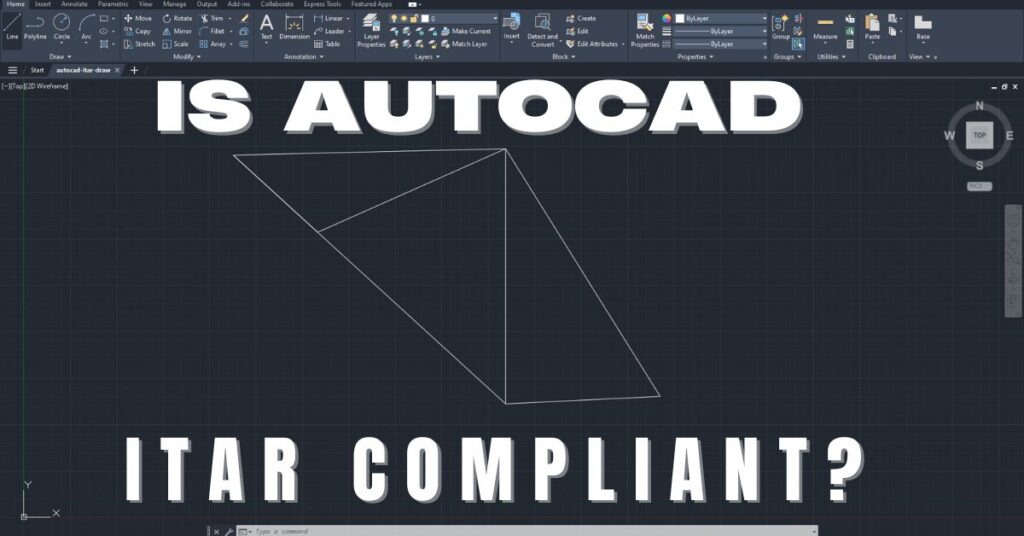Introduction
ITAR (International Traffic in Arms Regulations) is a set of regulations that govern the export and import of defense articles and services. Companies involved in the manufacturing or distribution of defense articles and services are required to comply with these regulations. Compliance with ITAR is important to ensure that sensitive military technology is not shared with foreign governments or individuals who may pose a threat to national security.
While there is no ITAR certification process, the Directorate of Defense Trade Controls (DDTC), the federal agency responsible for enforcing ITAR regulations, does offer guidance and assistance to companies seeking to establish compliance. The DDTC may review a company’s compliance procedures and provide feedback, but they do not issue a formal certification of compliance.
It’s important for companies to understand that compliance with ITAR is an ongoing process and that there is no easy or quick way to become “ITAR certified.” Instead, companies must take steps to ensure that they are meeting the necessary requirements and maintaining compliance with ITAR regulations. This may include designating a point of contact for ITAR compliance, conducting training for employees, establishing procedures for handling ITAR-controlled information and materials, and conducting regular audits to ensure that compliance procedures are effective and up-to-date.
Importance of ITAR certification
As mentioned earlier, there is no such thing as ITAR certification. However, compliance with the International Traffic in Arms Regulations (ITAR) is of critical importance to companies involved in the manufacturing or distribution of defense articles and services. Here are some reasons why:
- Legal Compliance: Compliance with ITAR regulations is mandatory. Failure to comply with these regulations can result in significant fines and penalties. In addition, non-compliance can also lead to damage to a company’s reputation and relationships with partners and customers.
- National Security: ITAR regulations are in place to protect sensitive military technology from falling into the wrong hands. Ensuring compliance with these regulations helps to prevent the transfer of this technology to foreign governments or individuals who may pose a threat to national security.
- Market Access: Many countries require that companies exporting defense articles and services comply with ITAR regulations. Compliance with these regulations is therefore essential for accessing certain markets and expanding business opportunities.
- Industry Best Practices: Even if compliance with ITAR regulations is not a legal requirement for a particular company, establishing compliance procedures can help to demonstrate a commitment to best practices in the defense industry.
Clarification that there is no such thing as ITAR certification
It’s important to clarify that there is no such thing as ITAR certification. While some companies may advertise that they are “ITAR certified,” this is not a valid claim. The U.S. Department of State, which oversees the enforcement of ITAR regulations, does not issue formal ITAR certification.
This is because compliance with ITAR regulations is an ongoing process, and there is no single assessment or set of requirements that can certify a company as ITAR compliant. Instead, companies must establish and maintain compliance procedures that meet the requirements of ITAR regulations, and ensure that these procedures are effective and up-to-date.
The U.S. Department of State’s Directorate of Defense Trade Controls (DDTC) can provide guidance and assistance to companies seeking to establish compliance with ITAR regulations. However, the DDTC does not issue formal certification of compliance.
It’s important for companies to understand that compliance with ITAR is a continuous process, and that there is no easy or quick way to become “ITAR certified.” Instead, companies must establish and maintain effective compliance procedures to ensure ongoing compliance with ITAR regulations.
Understanding ITAR Regulations
ITAR (International Traffic in Arms Regulations) is a set of regulations that governs the export and import of defense articles and services in the United States. The regulations are administered by the U.S. Department of State’s Directorate of Defense Trade Controls (DDTC). ITAR regulations cover a broad range of defense-related items, including firearms, ammunition, military vehicles, electronic equipment, and software. The regulations also apply to technical data and services related to these items.
Under ITAR regulations, companies involved in the manufacturing, distribution, and export of defense articles and services are required to comply with a number of requirements. These requirements include:
- Registration: Companies must register with the DDTC if they engage in the manufacture, export, or brokering of defense articles and services.
- Licensing: Companies must obtain a license from the DDTC before exporting any defense articles or services. There are a number of different types of licenses, including permanent and temporary licenses.
- Recordkeeping: Companies must maintain detailed records of all defense-related transactions, including exports, imports, and brokering activities.
- Security: Companies must establish procedures for the handling and storage of defense articles and services to ensure that they are protected from unauthorized access.
- Reporting: Companies must report any suspected violations of ITAR regulations to the DDTC.
Compliance with ITAR regulations is mandatory, and failure to comply can result in significant fines and penalties. In addition, non-compliance can also lead to damage to a company’s reputation and relationships with partners and customers.
Overview of the different categories of defense articles and services
ITAR regulations cover a wide range of defense-related items and services. These items are divided into various categories based on their intended use and technical characteristics. The following is an overview of the different categories of defense articles and services under ITAR:
- Category I: Firearms, Close Assault Weapons and Combat Shotguns, Ammunition/Ordnance, and Launching Equipment
This category includes firearms, ammunition, ordnance, and other related items. It also includes the associated components, parts, and accessories.
- Category II: Gas Turbine Engines and Associated Equipment
This category includes gas turbine engines, associated equipment, and related technical data.
- Category III: Ammunition/Ordnance
This category includes ammunition and ordnance, as well as the associated components, parts, and accessories.
- Category IV: Launch Vehicles, Guided Missiles, Ballistic Missiles, Rockets, Torpedoes, Bombs, and Mines
This category includes various types of missiles, rockets, bombs, mines, and other related items. It also includes the associated components, parts, and accessories.
- Category V: Explosives and Energetic Materials, Propellants, Incendiary Agents, and Their Constituents
This category includes various types of explosives, propellants, incendiary agents, and related items.
- Category VI: Vessels of War and Special Naval Equipment
This category includes vessels of war, as well as the associated equipment and technical data.
- Category VII: Tanks and Military Vehicles
This category includes tanks, military vehicles, and related technical data.
- Category VIII: Aircraft and Associated Equipment
This category includes aircraft, helicopters, and related equipment and technical data.
- Category IX: Military Training Equipment and Training
This category includes military training equipment, as well as the associated technical data.
- Category X: Personal Protective Equipment
This category includes various types of personal protective equipment, such as body armor and helmets.
- Category XI: Military Electronics
This category includes various types of military electronics, such as radar systems, communication equipment, and electronic countermeasures.
- Category XII: Fire Control, Laser, Imaging, and Guidance Equipment
This category includes various types of fire control, laser, imaging, and guidance equipment, as well as related technical data.
Importance of understanding ITAR regulations
Understanding ITAR regulations is crucial for companies involved in the defense industry, as non-compliance with these regulations can result in significant legal and financial consequences. The following are some of the key reasons why understanding ITAR regulations is important:
- Compliance: Compliance with ITAR regulations is mandatory, and companies involved in the manufacture, distribution, and export of defense articles and services must adhere to the requirements of these regulations. Failure to comply can result in significant fines and penalties, as well as damage to a company’s reputation and relationships with partners and customers.
- National Security: ITAR regulations are in place to protect national security by preventing sensitive defense-related items and services from falling into the wrong hands. Understanding these regulations is essential for ensuring that these items and services are properly controlled and secured.
- Export Opportunities: Compliance with ITAR regulations is essential for companies that wish to export defense articles and services. Understanding these regulations can help companies navigate the complex licensing and compliance requirements involved in exporting these items and services.
- Risk Management: Understanding ITAR regulations is an important aspect of risk management for companies involved in the defense industry. Failure to comply with these regulations can result in legal and financial risk, as well as damage to a company’s reputation and relationships with partners and customers.
- Competitive Advantage: Companies that understand ITAR regulations and comply with these requirements can gain a competitive advantage in the defense industry. Compliance with these regulations can help companies establish themselves as reliable and trustworthy partners for customers and partners in the defense industry.
Determining if ITAR Compliance is Required
ITAR compliance may be required in various situations involving the manufacture, distribution, and export of defense-related items and services. Some of the common situations where ITAR compliance may be necessary include:
- Manufacturing of Defense Articles: Any company involved in the manufacture of defense articles, such as firearms, ammunition, military vehicles, and aircraft, must comply with the ITAR regulations. This includes companies that manufacture components or parts for defense articles.
- Export of Defense Articles: The ITAR regulations control the export of defense articles and services, including technical data related to these items. Companies that export or provide technical data related to defense articles, including through electronic means, must comply with ITAR regulations.
- International Traffic in Arms Regulations (ITAR) Agreement: Companies that have entered into an ITAR agreement with the U.S. government must comply with ITAR regulations. These agreements are typically required for companies that receive defense-related technology or technical data from the U.S. government.
- Foreign Military Sales (FMS) Program: The FMS program is a U.S. government program that facilitates the sale of defense articles and services to foreign governments. Companies that participate in the FMS program must comply with ITAR regulations.
- Subcontracting: Companies that subcontract with a U.S. government contractor for defense-related items or services must comply with ITAR regulations. This includes companies that manufacture or supply components or parts for defense articles.
Importance of determining if ITAR compliance is necessary
Determining whether ITAR compliance is necessary is crucial for companies involved in the manufacture, distribution, and export of defense-related items and services. Failure to comply with ITAR regulations can result in significant penalties, including fines, imprisonment, and damage to a company’s reputation.
There are several reasons why it is essential to determine whether ITAR compliance is necessary for a particular company or project:
- Legal Obligation: The U.S. government requires compliance with ITAR regulations for companies involved in the manufacture, distribution, and export of defense-related items and services. Failure to comply can result in legal consequences, including civil and criminal penalties.
- National Security: ITAR regulations are designed to protect national security by controlling the export of sensitive technologies. It is crucial for companies to comply with ITAR regulations to prevent the unauthorized transfer of defense-related technology to other countries or entities.
- Reputation: Non-compliance with ITAR regulations can damage a company’s reputation and lead to loss of business opportunities. Companies that demonstrate a commitment to compliance with ITAR regulations can strengthen relationships with government agencies, foreign customers, and other stakeholders.
- Cost Savings: Establishing and maintaining ITAR compliance can be expensive, but the cost of non-compliance can be even higher. Companies that fail to comply with ITAR regulations can face significant fines and legal fees.
Establishing ITAR Compliance
Establishing ITAR compliance can be a complex process, but there are several key steps that companies can take to ensure they are in compliance with ITAR regulations:
Designate a Point of Contact
Designating a point of contact is an important step in establishing ITAR compliance for companies involved in the manufacture, distribution, and export of defense-related items and services. The following are some of the key reasons why designating a point of contact is important:
- Streamlined Communication: Designating a point of contact for ITAR compliance ensures that all communication related to ITAR compliance is directed to a single individual or team. This helps to streamline communication and ensure that compliance-related issues are addressed promptly and effectively.
- Clear Responsibility: By designating a point of contact, companies can ensure that there is a clear and accountable person or team responsible for ITAR compliance. This helps to ensure that compliance-related issues are prioritized and addressed in a timely manner.
- Compliance Monitoring: The designated point of contact can monitor compliance activities within the company, ensuring that all employees are following established compliance policies and procedures. This includes tracking training programs, audits, and licensing and registration requirements.
- External Communication: The designated point of contact can serve as the primary contact for external parties, such as regulatory agencies and customers, in matters related to ITAR compliance. This helps to ensure that external parties receive consistent and accurate information regarding the company’s ITAR compliance practices.
- Ongoing Improvement: The designated point of contact can also be responsible for identifying areas for improvement in the company’s ITAR compliance practices. This includes conducting regular reviews of compliance policies and procedures and implementing changes as needed.
Personnel Training
Conducting training is a critical step in establishing ITAR compliance for companies involved in the manufacture, distribution, and export of defense-related items and services. The following are some key reasons why training is important and some best practices to consider when conducting ITAR compliance training:
- Ensuring Employee Understanding: ITAR compliance training ensures that employees understand the regulations and requirements related to the manufacture, distribution, and export of defense-related items and services. This helps to ensure that all employees are on the same page when it comes to compliance, reducing the risk of accidental violations.
- Keeping Up-to-Date: ITAR regulations and compliance requirements can change frequently, so it’s essential that employees receive ongoing training to keep up-to-date on the latest requirements. This helps to ensure that the company is always in compliance with the latest regulations and reduces the risk of fines and penalties.
- Avoiding Non-Compliance: Without proper training, employees may accidentally violate ITAR regulations, which can result in serious consequences for the company. Providing training helps to avoid these accidental violations and reduces the risk of non-compliance.
- Best Practices: When conducting ITAR compliance training, it’s important to consider best practices. This includes using a variety of training methods, such as in-person and online training, and ensuring that all employees receive training on a regular basis.
- Documentation: It’s essential to document all ITAR compliance training activities, including who received training, when it was completed, and what topics were covered. This documentation can be used to demonstrate compliance to regulatory agencies if necessary.
- Monitoring and Updating: It’s important to monitor the effectiveness of ITAR compliance training and update the training program as needed. This helps to ensure that employees are retaining the information and that the training program is always up-to-date with the latest requirements.
Establish Procedures
Establishing procedures is a key step in establishing ITAR compliance for companies involved in the manufacture, distribution, and export of defense-related items and services. Procedures help ensure that employees know what is expected of them when it comes to compliance, reduce the risk of accidental violations, and provide a framework for ongoing compliance activities. The following are some best practices for establishing procedures for ITAR compliance:
- Identify Key Processes: The first step in establishing procedures is to identify the key processes within the company that are subject to ITAR regulations. This includes processes related to the manufacture, distribution, and export of defense-related items and services.
- Develop Written Procedures: Once the key processes have been identified, written procedures should be developed that outline the steps that employees need to take to comply with ITAR regulations. Procedures should be clear and concise, and should be easily accessible to all employees.
- Include Key Information: Procedures should include key information such as who is responsible for compliance, what steps need to be taken to comply, and what documentation is required. Procedures should also include information on how to identify ITAR-controlled items and how to handle them appropriately.
- Train Employees: Once procedures have been developed, all employees should be trained on the procedures and how to comply with them. Training should be ongoing, with regular updates as procedures change or new regulations are introduced.
- Review and Update Procedures: ITAR regulations and compliance requirements can change frequently, so it’s important to review and update procedures on a regular basis. This helps to ensure that the procedures are always up-to-date with the latest requirements.
- Monitor Compliance: Procedures should include steps for monitoring compliance, including regular audits and inspections. This helps to identify any potential compliance issues and take corrective action as needed.
Conduct Regular Audits
Conducting audits is a critical step in establishing ITAR compliance for companies involved in the manufacture, distribution, and export of defense-related items and services. Audits help to identify potential compliance issues, assess the effectiveness of compliance programs, and demonstrate compliance to regulatory agencies. The following are some best practices for conducting ITAR compliance audits:
- Develop an Audit Plan: The first step in conducting an ITAR compliance audit is to develop an audit plan. The plan should identify the scope of the audit, the objectives of the audit, the criteria that will be used to assess compliance, and the procedures that will be used to conduct the audit.
- Conduct a Risk Assessment: A risk assessment should be conducted prior to the audit to identify potential areas of non-compliance. This assessment should consider factors such as the complexity of the company’s operations, the volume of ITAR-controlled items produced, and the level of compliance risk associated with different processes.
- Use a Team Approach: Audits are typically most effective when conducted by a team of individuals with diverse skills and knowledge. The team should include individuals with expertise in ITAR regulations, manufacturing processes, and quality assurance.
- Document Findings: It’s important to document all findings from the audit, including any potential areas of non-compliance and any corrective actions that are recommended. This documentation can be used to demonstrate compliance to regulatory agencies if necessary.
- Take Corrective Action: Any potential areas of non-compliance that are identified during the audit should be addressed promptly. This may involve implementing new procedures, providing additional training to employees, or taking other corrective actions as necessary.
- Follow-up: Follow-up is an important step in the audit process to ensure that corrective actions have been implemented effectively. It’s important to monitor compliance on an ongoing basis and conduct regular audits to ensure that the company is maintaining compliance with ITAR regulations.
Importance of maintaining ITAR compliance
Maintaining ITAR compliance is of critical importance to companies involved in the manufacture, distribution, and export of defense-related items and services. The following are some of the key reasons why maintaining ITAR compliance is so important:
- Legal Consequences: Failure to comply with ITAR regulations can result in significant legal consequences, including fines, imprisonment, and loss of export privileges. Non-compliance can also lead to civil lawsuits and reputational damage to the company.
- National Security: ITAR regulations are designed to protect national security by controlling the export of defense-related items and services. Failure to comply with ITAR regulations can result in the transfer of sensitive technologies or information to unauthorized parties, which can pose a significant threat to national security.
- Business Opportunities: Maintaining ITAR compliance is critical for companies that want to participate in government contracts or work with prime contractors in the defense industry. Many government contracts require compliance with ITAR regulations, and failure to comply can result in loss of business opportunities.
- Competitive Advantage: Maintaining ITAR compliance can also provide a competitive advantage in the defense industry. Companies that are known for their strong compliance programs may be viewed more favorably by government agencies and prime contractors, and may be more likely to win contracts or secure partnerships.
- Reputation: Maintaining ITAR compliance is also important for protecting the reputation of the company. Non-compliance can result in negative publicity and damage to the company’s brand, which can have long-lasting effects on the company’s success.
Importance of seeking assistance with ITAR compliance
Seeking assistance from Cleared Systems for ITAR compliance is important for several reasons:
- Expertise: Cleared Systems has extensive experience in ITAR compliance and can provide expert guidance on all aspects of compliance with the regulations. They can help companies understand their obligations under the regulations and develop compliance programs that meet the requirements of the DDTC.
- Efficiency: Cleared Systems can help companies streamline their ITAR compliance processes, making it easier and more efficient to maintain compliance. This can save companies time and resources, and help ensure ongoing compliance with the regulations.
- Risk Management: Working with Cleared Systems can help companies manage the risk of non-compliance with the ITAR regulations. By identifying potential areas of risk and developing strategies to mitigate those risks, Cleared Systems can help companies avoid penalties, fines, and other legal consequences of non-compliance.
- Flexibility: Cleared Systems can work with companies of all sizes and in all stages of ITAR compliance. Whether a company is just starting to develop its compliance program or needs help fine-tuning an existing program, Cleared Systems can provide tailored solutions to meet their needs.
- Peace of Mind: By working with Cleared Systems, companies can have peace of mind knowing that their ITAR compliance is in good hands. Cleared Systems can provide ongoing support and guidance to ensure that companies stay up-to-date with the latest ITAR regulations and maintain compliance over time.
Conclusion
In summary, ITAR compliance is critically important for companies involved in the manufacture, distribution, and export of defense-related items and services. The ITAR regulations are designed to protect national security by controlling the export of sensitive technologies, and non-compliance with the regulations can result in severe penalties, fines, and legal consequences.
Establishing ITAR compliance requires designating a point of contact, conducting training, establishing procedures, conducting audits, and maintaining ongoing compliance. Seeking assistance from expert ITAR compliance providers like Cleared Systems is highly recommended to ensure efficiency, risk management, flexibility, and peace of mind.
Maintaining ITAR compliance is essential to avoid reputational damage, regulatory sanctions, and other legal and financial consequences of non-compliance. It also helps to ensure ongoing success in the defense industry and strengthens partnerships with U.S. Government agencies, foreign customers, and other stakeholders. Therefore, companies should make ITAR compliance a top priority to protect their business and national security interests.
If you are a company that operates in the defense industry or is considering entering this field, it is essential to determine whether ITAR compliance is necessary for your business. If so, you should take steps to establish and maintain ITAR compliance, including designating a point of contact, conducting training, establishing procedures, conducting audits, and contacting Cleared Systems.
By taking these steps, you can demonstrate a commitment to compliance with ITAR regulations, protect national security, and avoid costly penalties. Don’t wait until it’s too late; take action today to establish ITAR compliance for your company.
Share in Social Media
See More Case Studies

Securing Defense Contracts: A DFARS 252.204-7012 Compliance Case Study
Discover how Cleared Systems helped a Federal Contractor successfully achieve DFARS 252.204-7012 compliance by strengthening its cybersecurity posture, giving it a competitive edge when bidding for DoD Contracts.

What is GCC High? For ITAR & CMMC 2.0
Microsoft 365 Government Community Cloud (GCC) High is a specialized cloud solution tailored for U.S. federal, state, local, tribal, and territorial government organizations, as well as for contractors who hold or process data subject to specific security regulations. In this article, we will explore the features, benefits, and differences between Microsoft 365 GCC High and other Office 365 offerings.

Is AutoCAD ITAR Compliant? A Comprehensive Guide for Defense Manufacturers
Defense contractors and manufacturers working with sensitive military technologies face a critical question when selecting computer-aided design software: Is AutoCAD ITAR compliant? This question becomes

How to Get Help in Windows: Guide to Security and Compliance Support
In today’s digital landscape, ensuring your computer systems are secure and compliant with industry regulations is essential for both businesses and individuals. Windows, as one

Microsoft Copilot for GCC High: Enhancing Security and Compliance
In today’s fast-evolving digital landscape, organizations that handle sensitive data, particularly those in government sectors or defense contractors, face growing pressure to maintain strict security
Partner with Us for Compliance & Protection
We’re happy to answer any questions you may have and help you determine which of our services best fit your needs.
Your benefits:
- Client-oriented
- Security
- Compliance
- Peace of mind
- Efficiency
- Trust
What happens next?
Schedule an initial meeting
Arrange a discovery and assessment call
Tailor a proposal and solution
